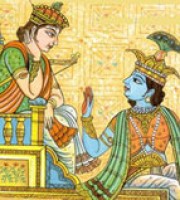Excerpt from my forthcoming rendition of Bhagavad-Gita. Chapter 13, from text 28 till the end – a bit abridged.
Krishna: “The Supreme Master is equally situated in all entities. Things which appear to be destroyed are indestructible.” They see this, because they truly see.
Arjuna: There are so many different people and things – how is it possible to see oneness and equality?
Krishna: These differences are in the field only, not in the field-knower. All deeds and endeavors occur in, and by, the field. The field-knower, however, is not truly involved in any of it. That is real vision, try to see it.
Arjuna: Why should I give more preference to the field-knower, the “true self.” Why not focus on its identity as a participant in the field?
Krishna: Even if you focus upon the field, you will find it is all essentially one, despite the infinite variations in its appearance. All the very different external manifestations of things are simply expansions from the singularity of the field. Try to see the truth of this theory and you will have a spiritual vision of the world.
Arjuna: But why shouldn’t I focus upon the being the self becomes when it mixes with its field?
Krishna: Arjuna, the field-knower dwells within the body, but does not blend into it and does not truly do anything with it; because it is a causeless entity, beyond delimitations, inexhaustible, and superior to the field.
Arjuna: How can the soul be within the body, yet not blend into it and become implicated in it?
Krishna: Because it is a substratum, like space. Isn’t space everywhere, yet unblended and quite distinct from everything as well? Similarly, the soul is spread all throughout the body, yet remains distinct and unblended.
Arjuna: If it does not blend with the body, what is the point of spreading through it?
Krishna: To spread the illumination of consciousness! Just as one sun illuminates the entire world, the field-knower illuminate the entire body with consciousness.
